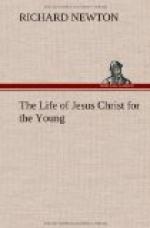And we may draw our illustrations from three sources, viz.:—from the Bible; from nature; and from everyday life.
There are two illustrations of which we may speak from the Bible. We find one of these in the history of the prophet Elijah. You remember that there was a great famine in the land of Israel during the lifetime of this prophet. For more than three years there was not a drop of rain all through the land. The fields, the vineyards, and gardens dried up, and withered, and yielded no fruit. During the first part of the time when this famine was prevailing, God sent Elijah to “the brook Cherith, that is before Jordan,” I. Kings xvii: 7-17. There the ravens brought him food, and he drank of the water of the brook.
But after awhile the brook dried up. Then God told him to go to the city of Zarephath, or Sarepta, on the coast of the Mediterranean Sea, and that he had commanded a widow woman there to sustain him. He did not tell him the name of the woman; nor the street she lived in; nor the number of her house. Elijah went. When he came near the place he met a woman, picking up some sticks of wood. I suppose God told him that this was the woman he was to stay with. Elijah spoke to her, and asked her if she would please give him a drink of water. When she was going to get it, he called to her again, and said he was hungry, and asked her to bring him a piece of bread. Then she told him that there was not a morsel of bread in her house. All she had in the world was a handful of meal in a barrel, and a little oil in a cruse, and that she was gathering a few sticks, that she might go and bake the last cake for herself and her son, that they might eat it and die. And Elijah said, “Fear not; go, and do as thou hast said; but make me thereof a little cake first, and bring it unto me, and after make for thee, and for thy son. For thus saith the Lord God of Israel, The barrel of meal shall not waste, neither shall the cruse of oil fail, until the day that the Lord sendeth rain upon the earth.”
This was a hard thing to ask a mother to do. It was asking her to take the last morsel of bread she had, and that she needed for herself and for her hungry boy, and give it to a stranger. Yet she did it; because she believed God. I seem to see her turning the meal barrel up, to get the meal all out. Then she pours out the oil from the cruse, and drains out the last drop. She mixes the meal and the olive oil together, as is the custom in that country still, and makes a cake which can soon be baked. She takes it to the man of God, who eats it thankfully, and is refreshed. Then she returns to the empty barrel and cruse, and finds as much in them as she had lately taken out. She prepares some bread for herself and her son, and they eat it thankfully as bread sent from heaven. The next day it is the same, and the day after, and so on through all the days of the famine. We are not told how




